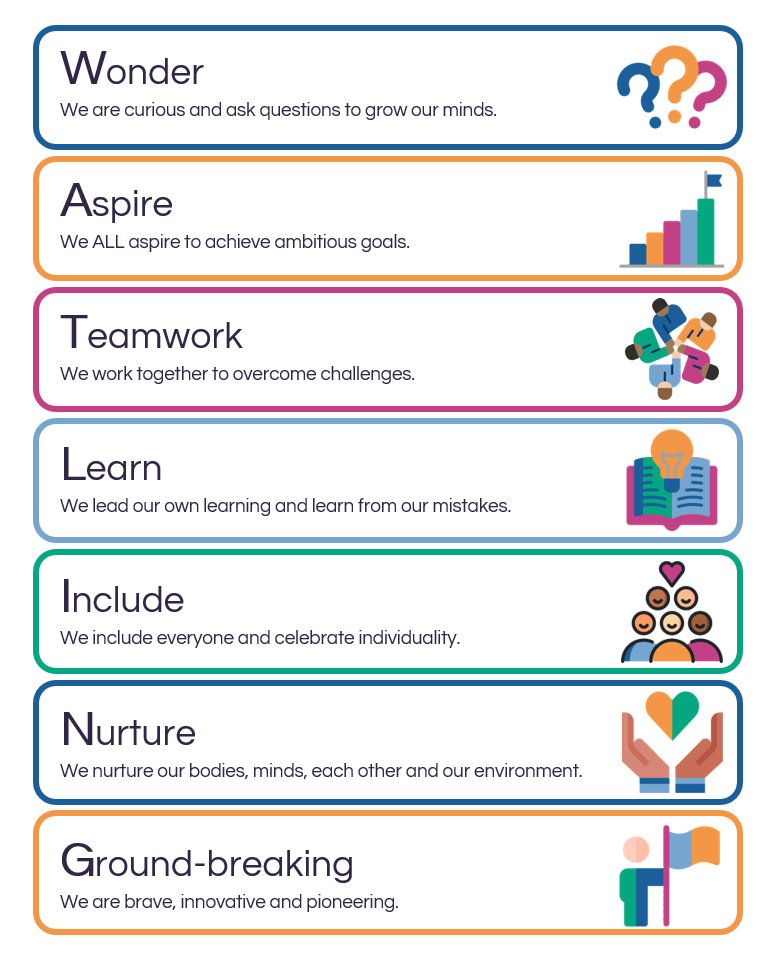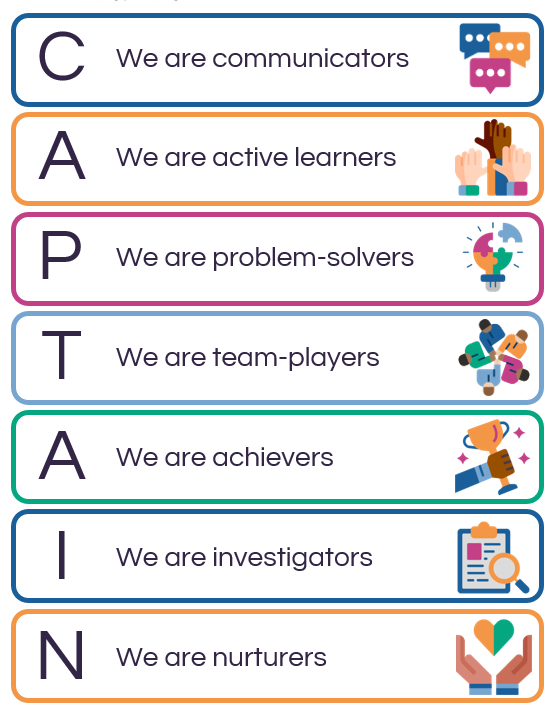
At Watling Primary School, the principles of the Early Years Foundation Stage Framework underpin our curriculum. We recognise that children learn best when they are actively involved in enquiry-based learning which supports the development of critical thinking. We believe that this approach to learning should continue beyond the Early Years, into Key Stage 1 and 2.
We work tirelessly to equip our pupils with the knowledge, skills and attributes they need to develop as well-rounded individuals. We want our children to be confident, ambitious and successful so that they are able to contribute positively to our community and society as they develop and grow.

CURRICULUM DRIVERS
Equality
We include everyone and celebrate individuality. We provide equal opportunities for all, regardless of culture, race, gender, religious beliefs, disability, age or relationships. We positively embrace our differences and believe that all voices have an equal right to be heard. We encourage our children to treat everyone fairly and equip them with the skills and understanding to challenge stereotypes and negative attitudes amongst others.
Equality of opportunity in education links closely with our curriculum driver of economic and emotional wellbeing. We believe every child has the right to access a high quality education in order that they can go on to achieve success and emotional wellbeing, irrespective of their starting points and free from social or economic disadvantage.
Economic and emotional wellbeing
We have a shared responsibility to prepare our children to achieve economic wellbeing in a local, national and global context. Children should be inspired to follow their dreams when they leave school, whether that be to secure a job, begin vocational training or go on to further education. All children deserve the opportunity to experience happy, fulfilled and successful lives.
At Watling Primary School, we focus on developing capabilities in STEAM subjects (Science, Technology, Engineering, Arts and Maths). In a modern, global and increasingly technological society, strong STEAM knowledge and a focus on this from an early age plays a key role in securing economic wellbeing.
We nurture our bodies, minds, each other and our environment. By providing significant opportunities for learning outdoors, we aim to connect children and staff with the natural environment. We embrace the benefits this brings for mental health and physical and emotional wellbeing.
Environment
From an early age, children need to understand the important role they must play in respecting and protecting the environment in a local, national and global context. We have a shared responsibility to contribute to preserving our planet to secure a positive and sustainable future for generations to come.
We provide opportunities throughout the curriculum for children to experience education in the environment, about the environment and for the environment.
CURRICULUM INTENT
What knowledge and skills do we want children to learn?
In addition to the Primary National Curriculum subjects, we focus on developing STEAM capabilities (Science, Technology, Engineering, Arts and Maths).
The holistic growth of every child through play, exploration, supported risk-taking and opportunities to make connections with the natural world forms an integral part of our curriculum. For this reason, learning outdoors in our Forest School is a key part of our provision.
To support the development of the whole child, we promote our Watling Way values and CAPTAIN Learning Characteristics at every opportunity. We nurture champions of equality with positive attitudes to economic and emotional wellbeing and a commitment to protecting our environment.


CURRICULUM IMPLEMENTATION
How will we teach the content of the curriculum?
The Watling Way values and CAPTAIN Learning Characteristics underpin our pedagogical principles and define what teaching and learning looks like in our school.
In all our teaching, we consider ways in which we can maximise opportunities to:
- take our learning outdoors
- embed our Watling Way values
- develop our CAPTAIN Learning Characteristics to become better Communicators, Active learners, Problem solvers, Team players, Achievers, Investigators and Nurturers
- promote our Curriculum Drivers of Equality, Economic and Emotional Wellbeing and Environment
National Curriculum Programmes of Study
The National Curriculum Programmes of Study outline the specific objectives that teachers will use to support their planning and assessment in discrete subjects. The objectives show progression across the year groups.
Enrichment opportunities, including trips and visits, are purposefully planned to give children additional life experiences that will inspire them and provoke intellectual curiosity.
Watling Primary Whole School Curriculum Overview
Our whole school curriculum overview shows the themes we teach, clearly mapped out across each separate subject over the course of an academic year. From these overviews, teachers produce medium-term plans which are then broken down into individual lessons to meet the specific needs of the children in their class.
Our curriculum is progressively planned and sequenced to ensure that children build on prior learning to provide the best opportunities for retention of knowledge and accelerated progress.
For enquiries about our curriculum, please contact the main school office where your enquiry will be passed on to either Mrs Burrows or Mrs Renwick.

IMPACT
How effective has our curriculum implementation been and how do we know this?
The impact of our curriculum is measured, monitored and evaluated at key points in the learning journey, using a range of performance indicators including, but not limited to:
- EYFS baseline assessments and progress data
- daily feedback and marking which takes place within lessons
- pupil voice
- regular Pupil Progress and Attainment Points
- professional dialogue, including staff appraisal meetings
- sampling of outcomes of work in books and through lesson visits
- regular monitoring and evaluation of targets for children with SEND or EHC Plans
- statutory testing (when appropriate) e.g. phonics screening, end of year and Key Stage assessments
- end of year summary reports
We do not rely on unnecessary testing – teachers know their children and are able to make well-informed and accurate judgements about their progress and attainment.
Regular professional dialogue between staff at all levels ensures that the progress and attainment of our children remains at the core of everything we do.



